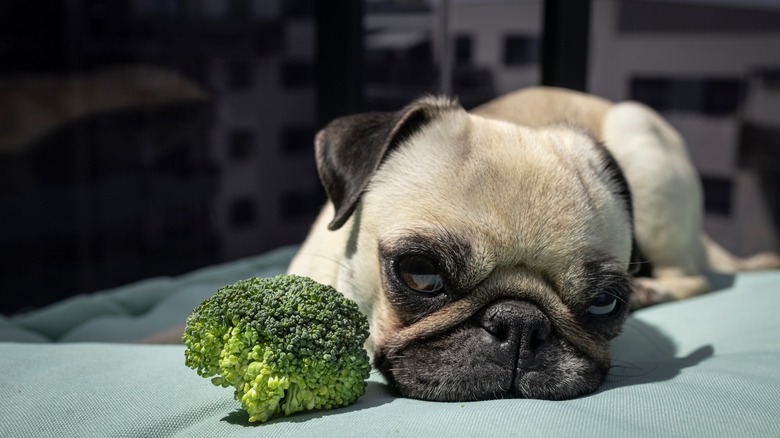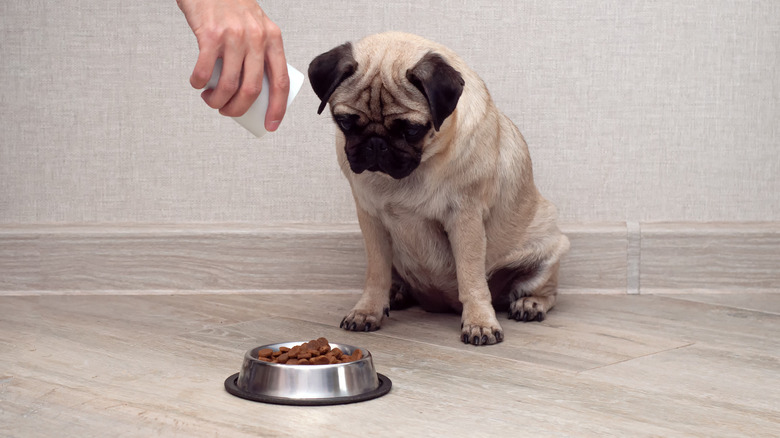Here's How To Treat Your Dog's Food Allergies
Having a healthy and happy dog in your home is an important goal for most pet owners. No one wants to see their puppy distressed. But sometimes, it may happen, especially if your dog has food allergies.
Most people often confuse food allergies with food intolerances, according to Nom Nom, mainly because of how alike the symptoms are. Food allergies have to do with your dog's immune response; your dog's immune system reacts negatively to a certain food — often protein — and triggers antibodies, eventually resulting in allergic reactions like itching, skin conditions, vomiting, etc., via Tufts University. Food intolerances, on the other hand, have nothing to do with your dog's immune system response, per Nom Nom, and usually mean your beloved family member is sensitive to some ingredient in their food, reports the American Kennel Club.
It is important to distinguish between symptoms when you're observing what happens to your dog during an allergic reaction to food. Doctor of Veterinary Medicine Justin Shmalberg shares that if the only abnormal behavior your dog is exhibiting is that he's scratching a lot, then it's safe to say he's not suffering from a food allergy, per Nom Nom. The most obvious symptoms with a food allergy are skin irritations, itchy ears and paws, diarrhea, throwing up, red eyes, sneezing, etc. and the less obvious signs are difficulty in breathing, discharge from the nose, loss of weight, agitation, lack of energy, and lack of appetite, via Nom Nom.
The first step in treating your dog is to find out what food is problematic
Although there are blood tests that claim to find the culprit, they're not the most accurate, per VCA Animal Hospitals. Your best chance is a food elimination trial.
With an elimination diet, it's crucial that you only give your dog food that he has not eaten before, reports VCA Animal Hospitals. Dr. Justin Shmalberg recommends "a non-contaminated simple ingredient diet" for up to 8 weeks, per Nom Nom. If the symptoms go away in that time, you can start to introduce the old foods, per VCA Animal Hospitals. If you notice the symptoms coming back, you can be sure that your dog has a food allergy.
Once you've zeroed in on the problem food, you can draw up a plan for an ideal diet for your pet, avoiding the allergens, according to VCA Animal Hospitals. While diets fashioned at home can be both easy and effective, you might want to work with a professional so you can ensure your dog is getting all the nutrients they need, advises Shmalberg to Nom Nom. Your vet might even be able to help you with suggestions for some hypoallergenic diets that are available out there, via VCA Animal Hospitals. Hypoallergenic diets essentially leave out common protein sources, according to PetMD. The food might also be hydrolyzed — broken down into negligible sizes — so that they don't cause an allergic reaction, reports VCA Animal Hospitals.
Some important things to remember with dog food allergies
It's best to be cautious about food labels when you go hypoallergenic food shopping for your dog. While some commercial dog foods contain ingredients that aren't labeled, there is also the question of purity, via Nom Nom. Although technically standards should be adhered to, "there's no oversight or regulation of the manufacturing" when it comes to companies that produce hypoallergenic dog food, according to Dr. Justin Shmalberg for Nom Nom.
Dog food allergies also take time to manifest and often require continued ingestion of the problem food, according to VCA Animal Hospitals. It's also possible that your dog develops new food allergies with time, per Dutch. Just like with humans, dogs' bodies change as they grow older, which can cause them to become allergic to foods they have been okay with before.
It might also be useful to know that pure carbohydrates that have a limited protein concentration in them are usually safer for dogs and that it is rather unusual to see a peanut allergy in a dog, via Nom Nom. Your dog's allergies often lead to more serious health conditions, so it's probably best you find the most effective form of treatment if you do notice a food allergy. While there is no known cure for dog food allergies, via VCA Animal Hospitals, you can at least ensure a better quality of life for both your dog and yourself.



